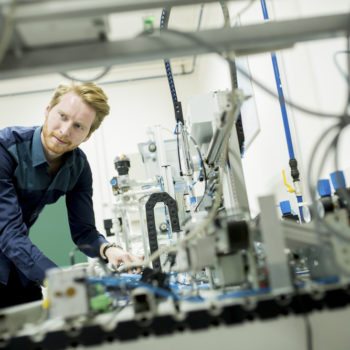Why We Love It
-
$46,110Potential Avg. Salary
-
12%Job Growth Rate
-
Growing DemandJob Outlook
-
Dependable Daily WorkloadCareer Attribute
Diesel mechanics conduct routine maintenance on and repair large vehicles—trucks, busses, and construction equipment—that are powered by diesel fuel. They conduct repairs on the engines of these vehicles, as well as the brakes, electrical systems, exhaust systems, transmissions, and steering systems.
Recommended Schools
What is a Diesel Mechanic?
The following job responsibilities are common for individuals in diesel mechanic roles:
- Discuss concerns with customers and perform diagnostic tests to determine needed repairs
- Perform routine inspections to identify maintenance needs before more severe problems occur
- Repair components of engines, transmissions, brakes, exhausts, and other vehicle systems
A Day in the Life
Diesel mechanics spend their days diagnosing and repairing vehicles that are powered by diesel fuel. Their work starts when a customer brings a vehicle in to be serviced. First, they must discuss any issues or concerns with the customer to begin the process of determining what maintenance is needed. In some cases, the vehicle may just need routine maintenance—oil changes, fluid replacement, air filter replacement, or tire changes. In other cases, more intense and complicated repairs may be needed.
Diesel mechanics use a variety of processes to diagnose issues. Sometimes they can identify the needed repairs just by listening to the problems a customer is experiencing. Sometimes, they need to hook the vehicle into a diagnostic machine to identify issues with electrical components or to collect issue records from the car’s computer system. Sometimes, the mechanic must take components apart on the car to look for nonfunctional, worn, or damaged parts. In these cases, the process may become trial and error.
Once the diesel mechanic discovers the source of the problem, he/she must conduct repairs. Diesel mechanics use a variety of tools to perform repairs. They use basic hand tools, more complex power tools, and major equipment like resurfacing machines and milling machines. When major engine repairs are needed, the diesel mechanic may need to remove the entire engine to perform repairs. When this is required, he/she must use engine lifts to safely remove the diesel engine from the vehicle.
Typical Work Schedule
Most diesel mechanics work full-time schedules, but the shifts may be irregular. To accommodate customers, mechanic shops are commonly open on weekends, so the role may require weekend work. Additionally, some diesel mechanic shops are open 24 hours to accommodate semi-truck repairs, so diesel mechanics who work for these employers may be required to work evening or overnight shifts.
Projected Job Growth
With online shopping now more popular than ever before, more companies are utilizing diesel vehicles to transport goods across the country. The high number of diesel vehicles being used is expected to increase demand for diesel mechanics over the coming decade.
Typical Employers
Diesel mechanics are commonly employed by truck transportation companies, mechanic shops, and wholesalers/distributors. Some product distribution and transportation companies utilize third-party mechanics, and some keep mechanics on staff at their facilities, so opportunities may be available across a variety of industries.
Recommended Schools
How To Become a Diesel Mechanic
The basic requirement for a career as a diesel mechanic is a high school diploma. In some high schools, aspiring mechanics can focus some of their coursework on a trade, and may be able to learn how to conduct automobile maintenance and repairs before graduation. If this opportunity is available, it’s a great way to gain the experience needed to find work after graduating from high school. If it’s not available at your school, you may need to find an entry-level position at a mechanic shop before or after high school to begin accruing professional experience and trade knowledge.
Conversely, many aspiring diesel mechanics choose to pursue a postsecondary certificate in diesel engine repair to learn the trade. Offered by community, trade, and vocational schools, these certificate programs offer both theoretical and practical training in the field. With a certificate, aspiring diesel mechanics may be able to find work as a diesel mechanic right after graduation without having to spend years working in entry-level or loosely related positions.
Beyond the education needed, most new diesel mechanics receive on-the-job training. They may spend a few weeks or months assisting an experienced diesel mechanic before performing maintenance and repairs independently. After working as a diesel mechanic for a few years, you can also sit for an exam offered by the National Institute for Automotive Service Excellence (ASE). If passed, this exam leads to formal certification and may enable you to find and secure high-paying jobs in the field.
Diesel Mechanic Salary Data
We’ve provided you the following to learn more about this career. The salary and growth data on this page comes from recently published Bureau of Labor Statistics data while the recommendations and editorial content are based on our research.
National Anual Salary
Low Range
$35,280Average
$46,110High Range
$66,940National Hourly Wage
Low Range
$17/hrAverage
$22/hrHigh Range
$32/hrHow do Diesel Mechanic salaries stack up to other jobs across the country? Based on the latest jobs data nationwide, Diesel Mechanic's can make an average annual salary of $46,110, or $22 per hour. This makes it an Above Average Salary. On the lower end, they can make $35,280 or $17 per hour, perhaps when just starting out or based on the state you live in.
Salary Rankings And Facts
#437 Nationally for All Careers
Programs and Degrees
Here are the most common degrees for becoming a Diesel Mechanic. a is usually recommended and specifically a degree or coursework that prepares you for the particular field, see below.
Highest Education Among Diesel Mechanics
- 0% Doctorate
- 0.5% Masters
- 3.3% Bachelors
- 10.2% Associates
- 24.6% College
- 47.2% High School
- 14.2% Less than High School
Job Growth Projections and Forecast
2014 Total Jobs
263,9002024 Est. Jobs
295,500Job Growth Rate
12%Est. New Jobs
31,600How does Diesel Mechanic job growth stack up to other jobs across the country? By 2024, there will be a change of 31,600 jobs for a total of 295,500 people employed in the career nationwide. This is a 12% change in growth over the next ten years, giving the career a growth rate nationwide of Below Average.
Growth Rankings And Facts
#150 Nationally for All Careers
What Companies Employ The Most Diesel Mechanics
| Industry | Current Jobs | New Jobs Needed | % Increase |
|---|---|---|---|
| General freight trucking | 34,000 | 900 | 1% |
| Local government, excluding education and hospitals | 23,700 | 6,300 | 6% |
| Motor vehicle and motor vehicle parts and supplies merchant wholesalers | 21,500 | 6,100 | 6% |












